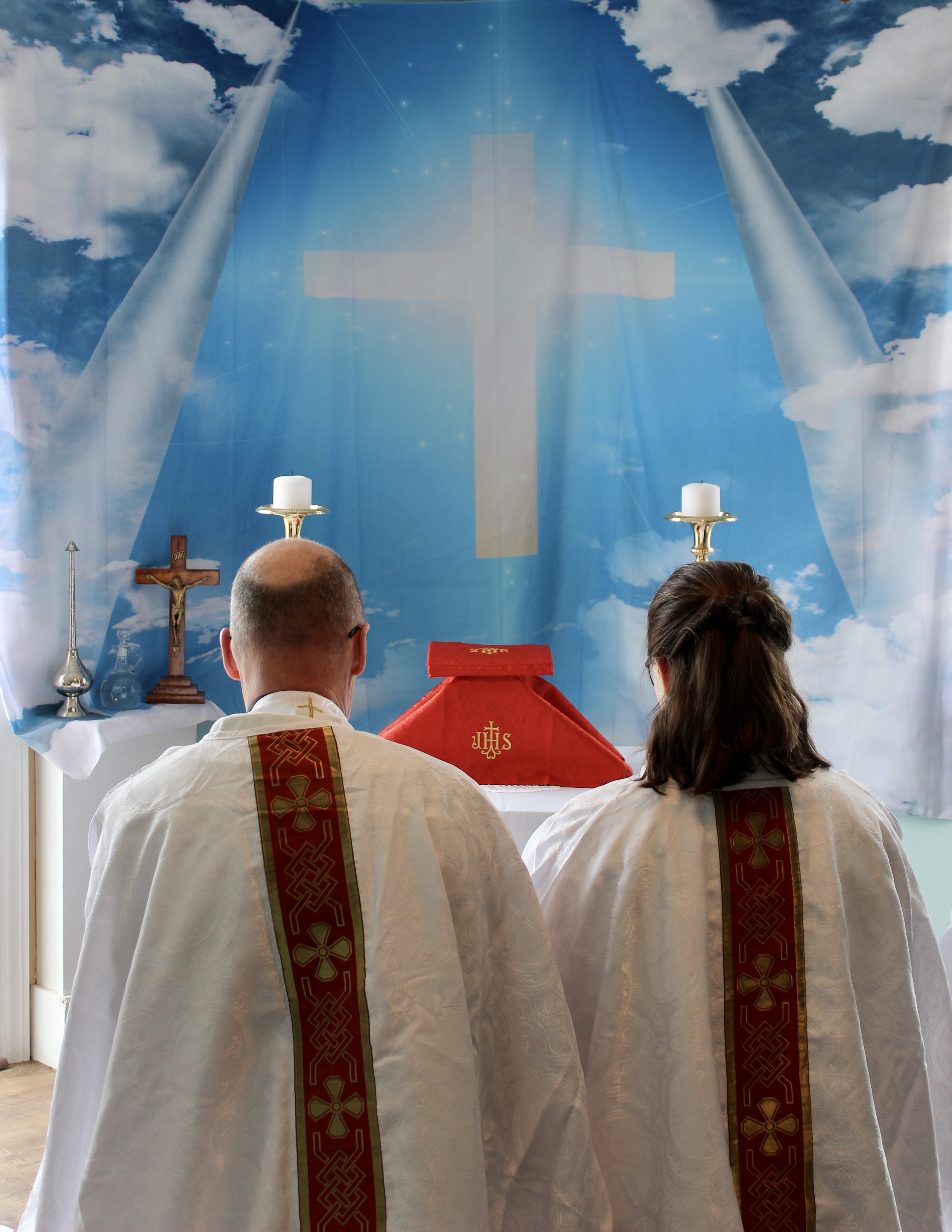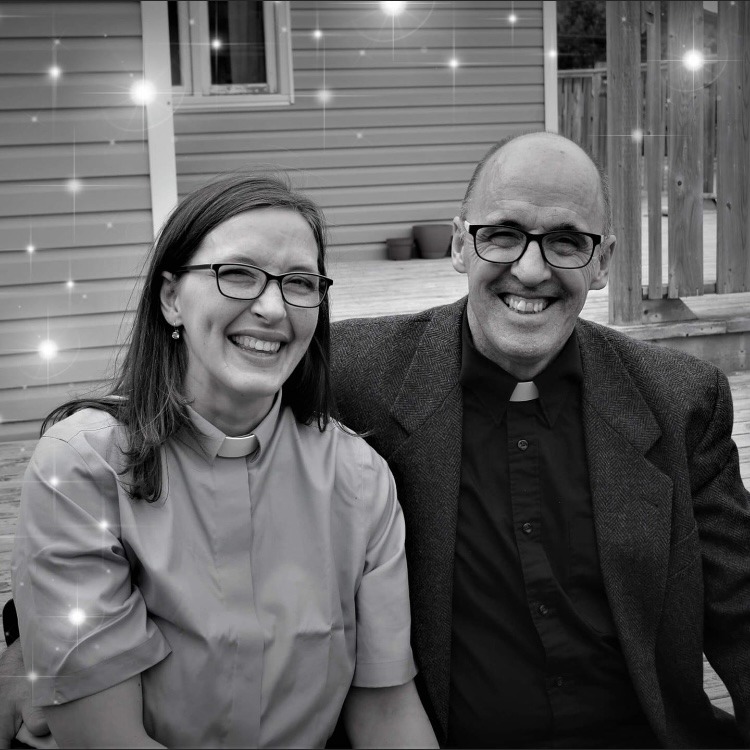Simply Catholic and Welcoming You
Sacramental Marriage Blessings and Protections, Compared to a Civil Wedding

Bishops Philip and Charlene Bradley Before the Altar. Married Bishops Who Love to See Couples Make Their Common Law or Civil Marriages Into Sacramental Marriages With God's Blessings and Protections on Their Union.
A sacramental marriage, specifically within a religious framework like that of the Catholic Churches, is understood to offer spiritual blessings and protections that a civil wedding, which is a legal contract, does not. These blessings are believed to come from God's grace, strengthening the marital bond and providing spiritual guidance and support. Sacramental marriage also emphasizes a commitment to a life of virtue and holiness, with the potential for stronger community support and a more profound spiritual connection.
To Catholics a Sacramental Marriage offers:
Sacramental Grace:
According to the Catholic Churches, couples receive a special grace from God to help them navigate the challenges of married life and stay committed to each other.
Spiritual Protection:
The sacrament of marriage is believed to offer protection against negative spiritual influences.
Emphasis on Virtue and Holiness:
Sacramental marriage is seen as a commitment to a life of virtue, avoiding sin and striving for holiness.
Community Support:
The couple becomes part of a larger faith community that provides support, prayers, and encouragement, within the Catholic Churches.
Blessings on Children:
Children born or adopted into a sacramental marriage are believed to benefit from a more stable, faith-filled environment.
Christ's Presence:
The couple invites Christ to be at the center of their marriage.
While a Civil Wedding offers:
Legal Validity:
A civil wedding is a legally recognized union, granting spouses their legal rights as a married couple.
Flexibility and Choice:
Civil weddings offer more freedom in terms of ceremony style and location.
No Sacramental Grace:
It does not involve the conferral of sacramental grace or spiritual blessings.
Potential for Less Community Support:
While support systems may exist, they may not be as strongly tied to the legal act of marriage as in a religious setting.
No Emphasis on Virtue:
A civil wedding does not inherently carry the same emphasis on virtue and holiness as a sacramental marriage.
Focus on Legal Aspects:
The focus is primarily on the legal and contractual aspects of the union.
When a sacramental marriage is officiated by a duly endorsed “clergy marriage commissioner” (this title varies from province to province), the marriage becomes BOTH sacramental and legal in every way.
Cohabitation:
Cohabitation is simply living together and may become ‘common law marriage’ when a couple resides together for specific time frames set out by each of the provinces. A case can be made that intimate relationships or cohabitation invariably produce unique dependency and require legal protections for their vulnerable members, so these protections do attach to cohabitation in every province other than Québec. Québec believes that people should be free to contract into, or perhaps out of, an optional legal regime based on cohabitation.
All of which goes to say that there are legal protections, including but not limited to division of assets, child custody and taxation benefits for couples involved in cohabitation, civil marriage and sacramental marriage. Yet, even these legal protections may not be the same for each, depending on which province the couple lives in.
Sacramental Marriage from the Catholic Perspective

Bishops Philip and Charlene Bradley Are Strong Advocates For Sacramental Marriage With Laughter, Joy and Love in Relationships and Church
The spiritual blessings and protections afforded from a sacramental marriage are globally the same for all believers. Indeed, for many Catholics, a sacramental marriage is not just a union of two people blessed by God, they see it as a marriage that will always include God as their primary partner in the relationship.
For Catholics, sacramental marriage is a physical and spiritual union of husband and wife so that they may be Christ to one another, to help each other become saints, and to spread the Gospel to all corners of the world by bearing children and teaching them the Catholic faith. When a marriage bears the fruit of children, the body of the Church has new members and clearly, this transcends natural marriage, but this is not the state’s concern.
To Catholics the State does no more than regulate “the civil effects of marriage” (Canon 1016). Which leads to the not-so-shocking conclusion that, to the Catholic, there is no such thing as a “civil marriage” at all. There is only the State regulation of the effects of a sacramental or natural marriage on society. At best then, in the Catholic view, the State can be a help or a hindrance to natural and sacramental marriages.
From the Catholic perspective, civil marriage is clearly insufficient, as it is not sacramental but that does not mean that from the Catholic perspective it is invalid. Catholics honor the societal norms of marriage and the marriage practices of other faiths. They just aren’t Catholic.
Indeed the Roman/Latin Catholic Catechism states:
“The intimate community of life and love which constitutes the married state has been established by the Creator and endowed by him with its own proper laws…. God himself is the author of marriage.” The vocation to marriage is written in the very nature of man and woman as they came from the hand of the Creator. Marriage is not a purely human institution despite the many variations it may have undergone through the centuries in different cultures, social structures, and spiritual attitudes. These differences should not cause us to forget its common and permanent characteristics. Although the dignity of this institution is not transparent everywhere with the same clarity, some sense of the greatness of the matrimonial union exists in all cultures. The well-being of the individual person and of both human and Christian society is closely bound up with the healthy state of conjugal and family life (n. 1603)”.
Further the Catholic Churches recognize that not all marriages will produce or adopt children yet these marriages are as valid and sacramental as those that do.
All Catholic Churches want all conjugal unions to be sacramental marriages. Mainstream Catholic Churches continue to wrestle with several barriers to achieving this goal.
St Brigit’s Community Catholic Church Stance on Sacramental Marriage

Bishops Philip and Charlene Bradley For Whom God is Very Much a Full Partner in Sacramental Marriage
At St. Brigit’s Community Catholic Church we recognize that there are a number of barriers to prevent many couples from seeking a sacramental marriage and we are determined to do all that we can to remove those barriers such that anyone who seeks to have their union blessed by God via sacramental marriage can do so.
Let’s first look at some of the barriers that can prevent couples from pursuing a sacramental marriage within the Catholic Churches. These include impediments like age, prior bond, and disparity of cult, as well as issues like coercion, fraud, and lack of proper form. Additionally, challenges like differing religious beliefs, refusal of procreation, or mental incapacity can also impede a valid sacramental marriage. (If some of the terms sound 'weird' please understand that they are the Canon law terms still in use.)
Here's a more detailed breakdown:
Age:
Canon law stipulates minimum age requirements for marriage (typically 16 for men and 14 for women - note please that Canon Law is global in scope and these ages do not reflect Canadian legal requirements). Provincial age requirements also vary but all contain parental consent for younger persons being married between the age of 16 and provincial age of majority. These legalities are non-negotiable.
Prior Bond:
If either party is already validly married, even if not a sacramental marriage, it creates an impediment to a new marriage. Couples must sort this out to the satisfaction of the provincial marriage office and then approach us with a valid marriage licence in hand in order to proceed with their marriage.
Disparity of Cult: For most Catholics, marrying a non-baptized person requires a dispensation from the mainstream Catholic Churches, and even then, it remains a natural (non-sacramental) marriage unless the non-baptized person is later baptized. We do have a non-denominational marriage liturgy for these cases.
Sacred Orders/Vows:
Those who have received sacred orders (e.g., priests) or have made public, perpetual vows of chastity are prohibited from marrying. This does not apply to St. Brigit’s Community Catholic Church as we openly embrace married clergy.
Coercion:
If one party is forced or unduly pressured into marriage, it is considered a defect of consent and invalidates the marriage. Law and non-negotiable.
Fraud:
If one party is intentionally deceived about a fundamental aspect of the other's character or circumstances, it can invalidate the marriage. Law and non-negotiable.
Other Challenges:
Lack of Form:
Catholics are required to marry according to the Church's laws and rites. Marrying outside the Church (e.g., in a civil ceremony or another religious setting) without proper dispensation is considered a lack of form. We are happy to “correct” this for couples wishing to make their marriage sacramental. No wedding licence is required for this as the civil marriage fulfills the legal status already. We simply have the couple repeat their vows in a sacramental ceremony which can be non-denominational for couples of different Christian faiths.
Exclusion of Essential Elements:
If either party explicitly excludes key aspects of marriage, such as fidelity or procreation, the marriage is invalid. Since we are an inclusive church, some of these exclusions simply do not apply for us, example procreation.
Differing Religious Beliefs:
While not always an impediment, significant differences in religious belief can create challenges and require a dispensation for marriage in mainstream Catholic Churches. We offer a non-denominational sacramental marriage service for couples of differing Christian faiths.
Mental Incapacity:
If one party lacks the mental capacity to understand the nature and responsibilities of marriage, it can invalidate the marriage. Law and non-negotiable.
Refusal of Procreation:
If either party explicitly excludes the possibility of having children, it can be considered an impediment to marriage in most mainstream Catholic Churches. We are inclusive, for us this does not apply.
Lack of Intimacy:
Some couples may face challenges related to intimacy due to religious teachings on sexuality or premarital relations. If a couple identifies this as an issue prior to marriage we advise seeking counselling or therapy before proceeding with the marriage.
Cost:
Many couples simply cannot afford a traditional church wedding/marriage. Let’s try to think beyond established ‘norms’ and ‘traditions’ as requirements. Some couples in that position (or for other reasons) simply elope. Whether they elope or simply drop the fanfare, marriage really only requires the couple, a valid marriage license, two witnesses and the officiant.
The location (church or otherwise), number of attendees, meals, fancy clothes, flowers or whatever else you can think to add are simply Not Requirements.
Yes, you can be married in a church building yet, grandma’s demands nor the priests do not make that a requirement. You can get the same sacramental marriage in your home, backyard, community hall, beach or anywhere else you can make space for the ceremony.
If people care about the couple over status, a home wedding and potluck may mean more to some couples than all the fancy clothes (and drunken brawls) that come with many weddings.
There is nothing wrong with the fantasy wedding nor the wedding planners and their big venues. Nothing wrong with church weddings. Hey we do these and more. Still sacraments, blessings and protections don’t need specific or fancy places and shows.
A true sacramental marriage is two people taking vows before God in a service officiated by clergy who are validly ordained to bless and sanctify the union before God and witnesses. Nothing more is needed!
If you are a couple who want to change their status from living together or civilly married to being a sacramentally married couple with the blessings and protections that this entails then, please, just do it!
Pre-marriage classes, demands to bring any children up in a specific faith, pomp and formality are all things that can shut some couples down. They are not requirements with us.
Blessing your union as a sacramental marriage is a priority! Now, do you want to come to us or for us to come to you? :)
Recent Articles
-
The Basic Catechism of the Catholic Church
Feb 12, 26 11:03 AM
A basic catechism of any rite or branch of the catholic church acts as a primary reference for teaching the faith -
The Divine Office
Feb 07, 26 11:07 AM
The Divine Office The Divine Office, also known as the Liturgy of the Hours or Opus Dei ("Work of God"), is the official, daily set of prayers of the Catholic Church -
Women Being Removed or Voided from Scriptures
Jan 17, 26 05:06 PM
The concept of women being "removed" or "voided" from scriptures refers to both the physical exclusion of female narratives in historical texts...
Boat Harbour West, Newfoundland, Canada. Cell Number 709-276-0626
Join Us Also on Our St. Brigit's Community Catholic Church Prayer group on Facebook: https://www.facebook.com/groups/324523956473448


